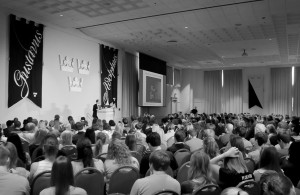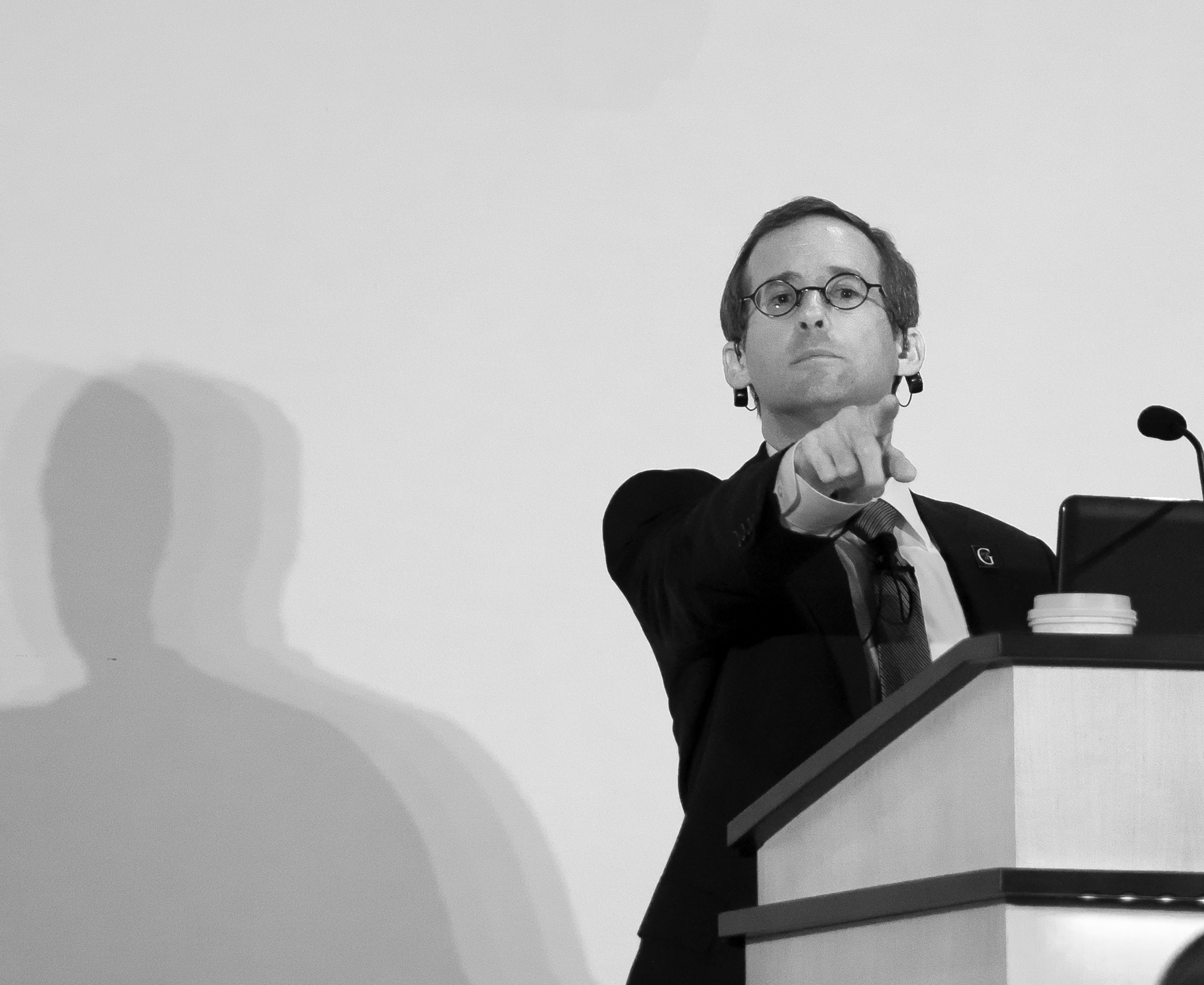Michael Chorost, technology theorist and author, went completely deaf in 2001 and had a computer chip implanted into his head, enabling him to hear again. This experience brought about his first book, Rebuilt: How Becoming Part Computer Made Me More Human.
In the book, he goes into detail about how having software generated electrical pulses connected to his cochlea has sparked his interest in what it means to be human and what the natural state of reality is to us—and that what is real to us does indeed change over time. On Sept 9, Chorost spoke to Gustavus students in Alumni Hall about re-evaluating the self.

When Chorost was born, he had partial hearing loss. In 2001, he finally lost all hearing and thus underwent surgery in order to hear again. Plainly seen as he spoke, he fashioned a headpiece which was magnetically connected to his implant. This implant was countersunk underneath his skin, sending out signals as a radio transmitter device, triggering auditory nerves sent to the brain as well as direct electrode stimulation. Chorost then went on to demonstrate how evolutionary the advancement of hearing has been—how different amount of electrodes can affect how one distinguishes different sounds. He then introduced neural prosthetics into the discussion, which uses several motors in the arms and wrists to enable movements of robotic limbs. Chorost also briefly spoke about Optogenetics, which is the use of light to make genetically altered neurons fire or stop firing. Chorost concludes his talk with the notion that cochlear implants were once an impossibility to many people—and alas, only the future will tell.
In his talk, Chorost also discussed the social implications of technology and how it has transformed society and poses the question as to whether or not this is dehumanizing. When asked if anyone would agree to connect his or her mind to the internet, many students opted not to. For those who chose not to connect their brains, it is safe to assume that some of the reasoning for this stems from insecurity and fear of “being exposed.” Chorost explained that technology can in fact make humans “more human” by confronting oneself in the nude sense and being able to face this fear. Although technology is often looked upon in a negative light—detracting attention from social interaction and promoting the loss of communication—technology is not always to blame. Chorost purveyed the message that humans are responsible for their own sense of humanity and empathy; being able to transmit feelings to someone else and learning how to communicate. He proposes that humanity can incorporate the computer into its collective soul in a way that enhances communities and creative work rather than diminishing them.
“We wanted to have a preview speaker for Nobel who could speak from a personal perspective,” Associate Professor, Director of Neuroscience in Biology and Neuroscience Mike Ferragamo said. “Fortunately, I taught a First Term Seminar class five or six years ago where I incorporated Chorost’s book, Rebuilt, and thought that Chorost would bridge the gap nicely, especially since he has worked with some of the Nobel speakers in the past.”
Associate Professor in Psychology and Neuroscience Janine Wotton, who also was a propagator in making the decision to have Chorost speak, commented on how well Chorost complements the slate of speakers for Nobel.
“The talk that Chorost has given gets people thinking and grasping where they fit into all this—you don’t have to be a neuroscientist to care,” Wotton said, explaining how she hopes the Gustavus campus will be thoughtfully responsive to these talks. She hopes that Chorost, along with Nobel, will raise deeper questions that students may not normally consider.
“There are things that you automatically do that you don’t really ask how these things actually work in the brain. There is scientific understanding behind everything, as well as philosophical. This poses serious questions, though. If we have the ability to do these things—what can we do, where should we stop?”
Professor in Physics and Director of the Nobel Conference Chuck Niederriter is hopeful of a similar outcome.
“Chorost was a compelling speaker, and I was quite impressed with the crowd. He raised interesting topics, and I hope that these students got the impression that there are parts of neuroscience that are technical and complex, but can nevertheless be relevant to them in various ways that may actually be fun and interesting to explore,” Niederriter said.
“I just hope this enthusiasm continues toward the conference. Chorost definitely gave us a few things to think about it, but there are harder questions to ask—serious ethical concerns and philosophy yet to discuss,” Niederriter said.

I believe that technology is to be used for helping us become healthier and happier, and not at the reverse that we’re being controlled by technology.
by microdermal piercing